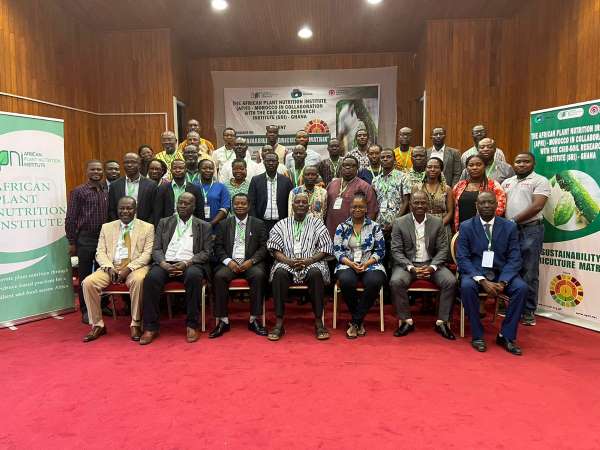As part of the Belmond Forum funded Sustainable Agriculture Matrix (SAM) Consortium led by the University of Maryland, Center for Environmental Science, the African Plant Nutrition Institute (APNI) in collaboration with the CSIR Soil Research Institute (SRI) organized a workshop in Kumesi, to engage key stakeholders and partners in order to develop a narrative for sustainability of cacao-based food systems in Ghana.
The Sustainable Agriculture Matrix (SAM) is a framework recently developed by the Center for Environmental Science, University of Maryland, USA, to measure agriculture sustainability and contribute to accountable and transparent monitoring of the SDGs. The SAM framework has 18 measurable indicators, based on three pillars of sustainability: economic, environmental, and social. SAM aims to serve as a platform to engage conversations among stakeholders involved in agriculture and to forge positive changes towards sustainability while avoiding unintended consequences.
To evaluate and further develop the SAM framework across socio-economic and environmental contexts, a group of multi-disciplinary teams across six world regions came together to form the SAM Consortium. APNI is part of the SAM Consortium and is supporting the evaluation of the SAM framework in Kenya, Ghana and Morocco.
In partnership with the CSIR Soil Research Institute (SRI), APNI is working to engage key stakeholders to identify critical sustainability indicators that are relevant for cacao cropping systems in the Ghanian context, and to suggest those that are missing from the current SAM framework.
The stakeholder engagement is conducted in a hybrid manner, first via a questionnaire that was sent out to gather information on the current experience in various agricultural sustainability issues and how institutions or organizations are addressing sustainable agriculture. This survey was followed-up through today’s face-to-face, one-day workshop that covered:
- SAM indicator descriptions, performance and historical trends
- Trade-offs and synergies
- Next steps









